
IGNITE conference asks the big questions

At October’s IGNITE 2023 national conference at the Brisbane Convention and Exhibition Centre, physiotherapists were exposed to some of the big questions facing the physiotherapy community. Here is a snapshot of key sessions.
Laying the foundations for learning
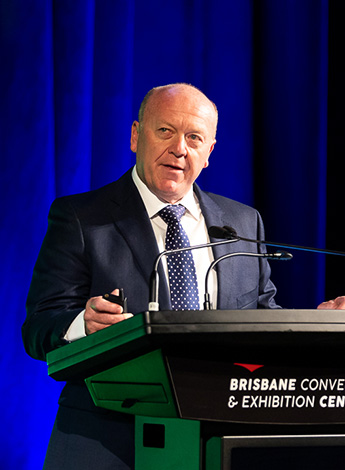
APA President Scott Willis addressed the crowd at IGNITE2023 national conference.
APA National President Scott Willis set a challenge for delegates during his address to open the conference—open your minds, get ready to expand your knowledge and question your current thoughts and outlook.
‘Walking in here today and seeing so many familiar faces, but also new ones, fills me with excitement about what this conference will ignite in us,’ Scott said.
‘I want you all to meet new people, make new connections and networks, take some time at the social events to relive some of the great moments and celebrate making new friendships.’
Acknowledging that it has been a ‘tough four years’ since the previous APA scientific conference was held in Adelaide in 2019, Scott told the audience at the Brisbane Convention and Exhibition Centre that Australia’s healthcare system was buckling under pressure in the post-COVID-19 years, highlighting the need for reform.
‘With a new government and the promise of a strong, properly funded public health system with Medicare as its backbone, we have a real opportunity for primary healthcare reform,’ he said.
‘We are advocating for evidence-led opportunities for system-wide reform—reform that improves value in healthcare and that drives a better patient and consumer journey, along with sustainable models of care for physiotherapists and better health outcomes for all Australians.’
Scott urged delegates at the conference to participate in the APA’s first census of the physiotherapy workforce, the 2023 Workforce Census.
‘We need to fill in our knowledge gaps about supply and demand factors, including publicly funded income streams, as well as strengthening our understanding of current barriers to practice.’
Reaping the benefits of manual therapy
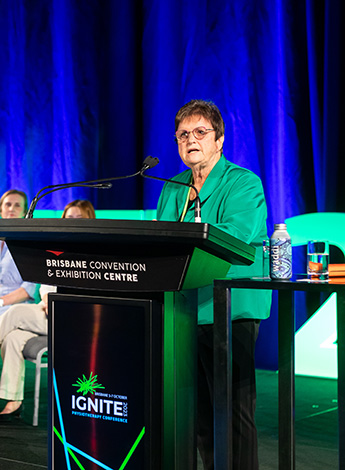
Gwen Jull facilitated a lively discussion about hands-on physiotherapy.
The privilege of being able to put hands on a patient and the use of manual therapy as part of a comprehensive patient treatment plan set physiotherapists apart from other health practitioners, a well-attended plenary session at the close of the first day of the conference has heard.
A panel of four clinicians from three fields of physiotherapy practice presented the ‘Physiotherapy: The hands-on profession’ plenary, facilitated by APA Honoured Member Emeritus Professor Gwendolen Jull FACP and introduced to the audience by the chair of the APA Board of Directors, Mark Round APAM.
The panellists were Helen Seale APAM, a clinical consultant physiotherapist for the Heart Lung Program at the Prince Charles Hospital in Brisbane; APA Musculoskeletal Physiotherapist Phillip Hughes APAM MACP, a private practitioner from Melbourne, an APA Musculoskeletal Physiotherapist and the immediate past chair of the APA Musculoskeletal group; Sarah Fitzhenry FACP, a Specialist Neurological Physiotherapist (as awarded by the Australian College of Physiotherapists in 2016) working at the Brighton Rehabilitation Unit, a 42-bed public inpatient rehabilitation hospital north of Brisbane; and Amy Papinniemi FACP, a Specialist Musculoskeletal Physiotherapist (as awarded by the Australian College of Physiotherapists in 2018) who works as an educator, as a clinician in private practice and in a tertiary hospital screening setting.
Gwen began by asking each panellist why they thought that hands-on practice is a fundamental component of physiotherapy.
Questions followed about its importance for physical assessments, whether there is a place for manual therapy, the management of musculoskeletal disorders and whether manual therapy could be a standalone treatment.
Panellists concurred that hands-on treatment is what physiotherapists are known for, that it’s what patients expect of their physiotherapist, that it is a foundation of clinical practice in the assessment and management of many conditions, that it enhances intervention and outcomes for patients and that its effectiveness is supported by evidence.
Hands-on treatment is also key to completing a comprehensive physical assessment of a patient, panellists noted.
Sarah added that it enhances the accuracy of neurological assessments, while Phillip emphasised the fact that manual therapy is essential to performing joint integrity tests or pain provocation tests.
‘It’s critical to be touching people while assessing them objectively and I’m really at a loss to understand how you could possibly assess someone objectively without touching them,’ he said.
The panellists agreed that hands-on manual therapy is not a standalone treatment.
Phillip pointed out that single modalities don’t work well in isolation.
‘Pain education is not effective by itself.
‘Exercise doesn’t work well by itself, either.
‘Manual therapy works best when it is combined with pain education, counselling and exercise therapy.’
They all felt that hands-on treatment has a place in the biopsychosocial model of care.
‘I think it’s about having a balanced perspective, for those of us who have a manual therapy bias to be encouraging exercise and education and for those who have an exercise bias to be thinking about when manual therapy might be appropriate.
‘That includes universities and educators,’ Amy said.
Innovative physios compete for Pitchfest prizes
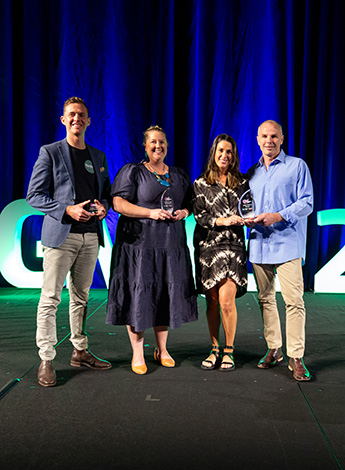
Pitchfest winners (L-R) Kevin Wernli, Sasha Job, Michelle Kahn and Gavin Williams.
A website and ultimately an assessment app based on the highly regarded spasticity manual A guide to the modified Tardieu Scale has won this year’s coveted Physio Pitchfest Judges’ Award.
The team behind it, led by Professor Gavin Williams FACP and Dr Michelle Kahn APAM MACP at Epworth HealthCare and the University of Melbourne, will receive $15,000 to put towards the development of the product and a one-hour-long consultation provided by Cohort Innovation Space.
The winners were announced during Physio Pitchfest, a Physiotherapy Research Foundation initiative held during the Friday morning plenary session.
Pitchfest was hosted by Yemi Penn, a ‘curious rebel’ dedicated to challenging the status quo to create a more just, equitable, diverse and inclusive world.
In addition to the Judges’ Award, two further awards were presented.
Sasha Job APAM received the People’s Choice Award, including $5000 and a half-day mentoring session provided by Pitchfest sponsor VALD Health, for her beach accessibility training course.
Dr Kevin Wernli APAM and Joanna Morris APAM were awarded the People’s Choice Rising Star Award, worth $1000, for their app for endometriosis education and support.
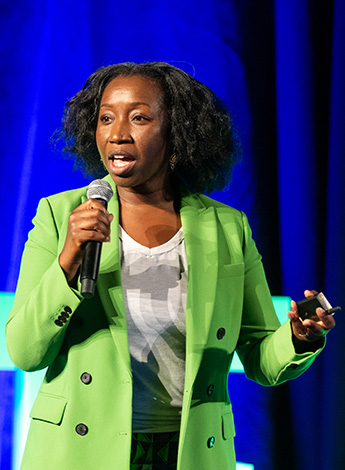
'Çurious rebel' Yemi Penn hosted the PRF Pitchfest.
The other three finalists were:
- Andrew Mencel APAM with the self-adjusting Mossa Cushion, which is designed to prevent pressure injuries in older people
- Barry Nguyen APAM, who has developed CliniScribe, an AI-powered app designed to streamline and speed up the process of writing notes, referral letters and reports
- Katharine Roberts APAM MACP and Jim Zouch APAM with their My Back Exercise app, which supports people with low back pain through a program encompassing diet, sleep and exercise.
While the judges deliberated and the audience voted, Yemi Penn talked about what it means to be a curious rebel, describing her journey from engineer to thought leader and entrepreneur.
Drawing on her own life as a single mum and a British-African woman in Australia, Yemi told the audience that understanding her own story and those of others helped her to ignite her rebellious curiosity.
‘Always be curious but do it with graceful compassion,’ she said.
Keep an eye on InMotion in 2024 as we profile each of the finalists and their innovative products.
College Fellows take the stage
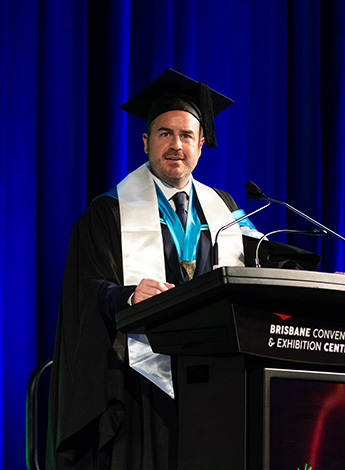
Australian College of Phsyiotherapists president Tom McMillan addressed the audience at the College graduation.
To thunderous applause from family, friends and colleagues, 33 new Fellows of the Australian College of Physiotherapists made their way onto the stage for their graduation ceremony.
‘Today we celebrate not only the culmination of years of hard work and dedication but also the beginning of a new chapter in the careers of our graduands,’ said College President Tom McMillan.
‘As they step into the world, they carry with them the values and principles that define our College and our profession.’
In the Founder’s Address, Professor Trudy Rebbeck FACP noted that the College graduates were the people most likely to implement much of the research that had been presented at the conference.
‘Your awareness is sharpened and your critical lens is wide open.
‘So you’ll not only implement [the research] but you’ll establish when, why and for whom that evidence works.
‘More importantly, you will establish where, why and for whom it doesn’t work,’ Trudy said.
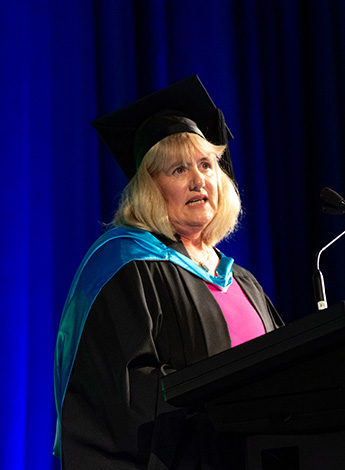
Professor Trudy Rebbeck gave the Founders Address at the College graduation.
Trudy urged the graduates to be bold and brave in taking up the opportunities that the emerging and diverse roles of physiotherapists now present.
Making the New Fellow’s Reply, Tim Austin FACP noted that he was one of six new specialists from the College’s first pain specialist cohort—an incredible achievement given that there wasn’t a pain special interest group at the APA a decade ago.
Tim told the gathering that each of the graduates had been supported on that journey by specialists at the College.
‘I lost count at about 30 specialists who directly helped me and I thank you all for the role that you played,’ he said.
‘The specialist training program and college are a microcosm of our profession.’
Congratulations to our new Fellows (listed below).
Musculoskeletal Physiotherapy
Stacey Cubitt
Taishi Ezaki
Paoline Li
Yuen Fong
Ivan Lin
Alicia Rayner
Mathew Smith
Harry Truong
Jonathan Wray
Neurological Physiotherapy
Elizabeth Moore
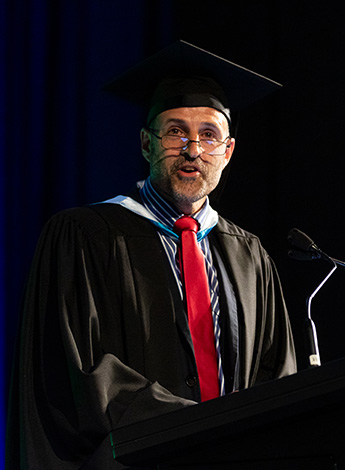
Tim Austin gave the New Fellow's Reply at the College graduation.
Pain Physiotherapy
Tim Austin
Anne Daly
Darren Doherty
Jon Ford
Matthew Forster
Michelle Wilson
Sports and Exercise Physiotherapy
Myles Burfield
Tim Oostenbroek
Zoe Russell
Kylie Turton
Clare Walsh
Women’s, Men’s and Pelvic Health Physiotherapy
Anita Bir
Alexandra Diggles
Hannah Graetz
Chloe Serrao
Angela James
Irena Nurkic
Original Contribution
Jon Ford
Catherine Granger
Alison Grimaldi
Joanne Kemp
Selina Parry
Catherine Sherrington
Susan Slade
Julia Treleaven
Moving towards telehealth 3.0
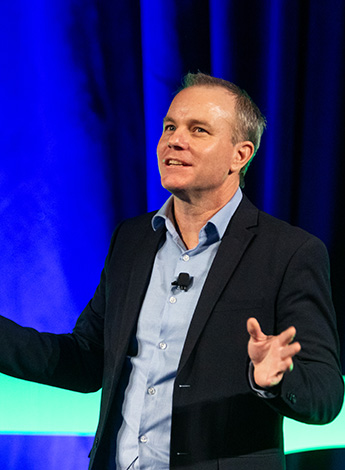
Professor Trevor Russell gave the Journal of Physiotherapy Rob Herbert Oration.
Professor Trevor Russell started working on telehealth in the early 2000s, developing a prototype system that allowed a patient and a clinician to interact remotely over the internet and showing in clinical trials that the desired clinical outcomes could be achieved.
In those early days of telehealth, the technological barriers were large and Trevor found it difficult to persuade clinicians and patients of its benefits, he told the audience at the Journal of Physiotherapy Rob Herbert Oration.
Trevor refers to the early days of telehealth as telehealth 1.0.
They were followed by the rapid adoption of telehealth practices by physiotherapists and other healthcare providers during the COVID pandemic and its lockdowns—a phase he calls telehealth 2.0.
Studies during the pandemic showed that once the technological barriers were breached, both clinicians and patients liked telehealth.
The pandemic also spawned a large number of clinical studies examining whether telehealth was able to deliver the same outcomes as in-person care.
Meta-analysis of these trials has confirmed that the two modalities are indeed equivalent and that in some cases, telehealth has been slightly ahead.
Since the pandemic eased, however, many clinicians have shifted back to in-person care, abandoning telehealth.
Trevor is now looking at telehealth’s next evolution, with an eye to identifying telehealth practices that work.
‘Some of the most successful studies out there have used the hybrid approach where you’re doing some in-person and you’re supplementing that with some telehealth,’ he said.
Trevor hopes that telehealth 3.0 will allow physiotherapists and other healthcare providers to adapt to the needs of the patient and not just those in rural and remote Australia.
Paper of the Year awarded
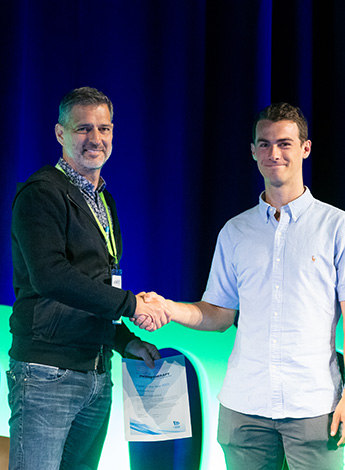
Mark Elkins presents Harrison Hansford with the JoP Paper of the Year Award for 2023.
Journal of Physiotherapy scientific editor Clinical Associate Professor Mark Elkins APAM awarded the Paper of the Year Award for 2023 to Harrison Hansford and colleagues for their paper ‘The smallest worthwhile effect on pain intensity of nonsteroidal anti-inflammatory drugs and exercise therapy for acute and chronic low back pain: a benefit-harm trade-off study’, published in the October 2023 issue.
The paper was chosen by members of the Journal’s international advisory board for having the best combination of scientific rigour and clinical implications.
Why me? The physio’s role in Reconciliation
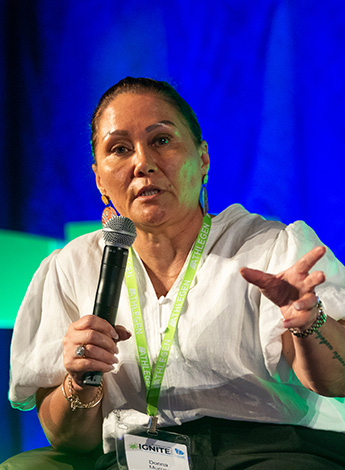
Donna Murray discussed the effects of racism and cultural determinants of health on First Nations peoples.
Poor cultural awareness can go both ways, says APA National President and Palawa man Scott Willis.
At the plenary session about the physiotherapist’s role in Reconciliation, Scott recalled a time several years ago when he rushed into implementing the APA’s Reconciliation Action Plan at his own physiotherapy clinic.
‘I went into a staff meeting and said, “This is what we’re going to implement.”
‘My assumption was that I knew my staff but I got a lot of pushback.
‘I had a poor assumption the other way—poor cultural awareness of non-Indigenous people,’ he said.
‘It’s a journey; you’re taking your staff on the journey as well and you might have some hiccups along the way like I did.
‘I had to just take a lot of steps back and not assume that everyone was going to be in the same place, on the same journey.’
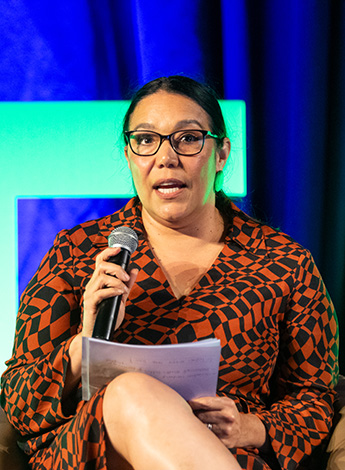
Janine Mohamed talked about the importance of cultural safety.
The Reconciliation session featured Adjunct Professor Janine Mohamed, CEO of the Lowitja Institute and a Narrunga Kaurna woman from South Australia; and Donna Murray, CEO of Indigenous Allied Health Australia and a Wiradyuri and Wonnarua woman of the Murrumbidgee River and Hunter Valley in New South Wales.
They talked about the importance of cultural safety in the healthcare setting as well as centring care around the patient’s needs in a culturally responsive way.
Janine said that health equity is central to the nature of the work physiotherapists and other health professionals do.
She talked about the importance of cultural safety training in the healthcare setting and beyond that in Reconciliation.
‘Often when I talk to health professionals about these issues, they very quickly say, “Well, I treat everyone the same.”
‘Cultural safety includes an understanding that equity and equality, terms that are often used interchangeably, have very different consequences.
‘Equality usually focuses on everyone having the same opportunities.
‘But that can only happen if everyone starts from the same place and needs the same sort of help.
‘In contrast, equity is giving everyone what they need to be successful.
‘Equity recognises that we need to start where a person is at and that it’s necessary to do things differently for everyone to achieve outcomes that are more equitable,’ Janine told the audience.
‘The simple truth that I offer you here today as an Aboriginal mother and daughter, as a nurse and a long-term policy specialist and now as the CEO of the Lowitja Institute, is that outcomes for our consumers or clients are better when they are consulted, when they are heard and when they are involved in their own healthcare options—when they are at the table.’
Donna talked about the cultural determinants of health in Aboriginal and Torres Strait Islander Peoples and communities.
‘For Aboriginal and Torres Strait Islander Peoples, culture is foundational in all aspects of our health and wellbeing, including the social determinants of health,’ Donna said.
‘Your role as physiotherapists in promoting, maintaining and restoring health should be grounded in supporting clients and their families to achieve what’s important to them.
‘For many, this will include the cultural determinants, being out there, being on Country to participate in cultural roles and obligations and retaining independence and self-determination.’
Donna also talked about the Aboriginal and Torres Strait Islander healthcare workforce, noting that in a recent survey, 71 per cent said they had experienced racism within the workplace setting in the previous 12 months, while 42 per cent had experienced racism within the educational university setting and 58 per cent within a clinical or work placement.
‘We know that experiences of cultural safety, discrimination, racism and lateral violence are significant factors in the decision-making and success of the current workforce and the future workforce for Aboriginal and Torres Strait Islander Peoples,’ Donna said.
Green space and climate change
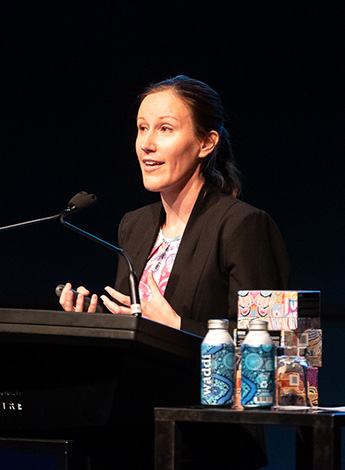
Jessica Stanhope talked about the impact of green space and biodiverse environments on health and wellbeing.
The impact of climate change and biodiversity loss on physiotherapy was the subject of one of the mini keynote sessions.
Professor Kathryn Bowen, an internationally recognised expert on the science and policy of sustainability and climate change from the University of Melbourne, talked first about the link between climate change and health.
‘Health impacts are often interconnected, are unevenly distributed across and within societies and will continue to be experienced inequitably. At its core, climate change is an issue of justice.
‘As a health community, we have a clear role to play both in mitigation and in adaptation,’ Kathryn said.
She noted that the types of lives that people will be living in the next few decades, and the environments they will be living in, are going to be gravely different from what we’re used to at the moment.
The next speaker was APA Research Physiotherapist Dr Jessica Stanhope APAM MACP, whose research at the University of Adelaide focuses on the impact of green space and biodiverse environments on health and wellbeing.
Jessica said that physiotherapists should talk to their patients about their exposure to biodiversity and encourage them to spend time outdoors.
‘That’s going to be challenging for a lot of our patients and clients, so we need to work with them to reduce those barriers,’ she said.
The final speaker was APA Honoured Member Professor Gillian Webb APAM AM, a physiotherapy academic from the University of Melbourne, who talked about the United Nations’ Sustainable Development Goals and the need for physiotherapists to be aware of climate change and sustainability issues.
‘There’s absolutely no doubt that it’s our role to be advocates for better health for our patients and our communities and we can’t do that if we don’t advocate for climate change mitigation, the sustainable goals and all the issues that surround them,’ Gillian said.
While new graduates are often the most passionate about issues surrounding climate change, Jessica said it was important to get more experienced physiotherapists on board.
‘We need to be targeting those groups of people who are five, 10 years out [from graduating], who’ve still grown up with the ideas of climate change.
‘They have more opportunity or the space to get involved; they might have more insights,’ she said.
Finding the path to passion
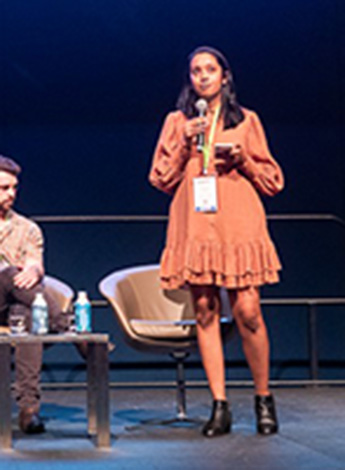
Dharsha Petrie was one of the presenters of the Ignite Your Passion mini keynote session.
Four early and mid-career physiotherapists offered personal insights into the myriad ways that physiotherapists can remain engaged with the profession during their mini keynote presentation on day two of the conference.
Ellie White, Dharsha Petrie APAM MACP, Adam Doyle APAM and Jennifer Lohmus APAM shared the stage and their compelling individual experiences of igniting or reigniting their passion for physiotherapy.
Dharsha, who has worked in neurological rehabilitation within public and private models of care and is a collaborator on the Functional Neurological Disorders Australia website, says she took a nonlinear route through her career to keep herself motivated and enthused.
The APA Neurological Physiotherapist says that being open to opportunities helped her to identify her professional strengths.
Adam, a Kamilaroi man and a member of the APA’s Aboriginal and Torres Strait Islander Health Committee, described his passion for working with First Nations Peoples in emergency, critical and musculoskeletal care.
Adam told delegates he’d had a varied career before becoming a physiotherapist through the University of Canberra, working as an allied health assistant, a carpenter and a builder.
Ellie, an associate lecturer and First Nations Health Lead within the Doctor of Physiotherapy program at the University of Melbourne who has also worked clinically at St Vincent’s Hospital in Melbourne, is passionate about creating positive change to make healthcare and education settings more accessible to, and culturally safe for, First Nations Peoples.
Ellie has been involved in a variety of projects and noted that as a recent graduate she has followed a non-traditional pathway, helping her to remain inspired.
Canadian-born Jennifer is working towards her APA Sports and Exercise Physiotherapy titling credential via the experiential pathway.
She told the audience that she is passionate about sports physiotherapy, particularly ice hockey.
Jennifer moved to Australia nine years ago to become a physiotherapist and sought mentorship through the APA mentoring program, which she says was an invaluable experience that helped her to explore her continuing education options and the various pathways available.
Closing speaker opens up on leadership
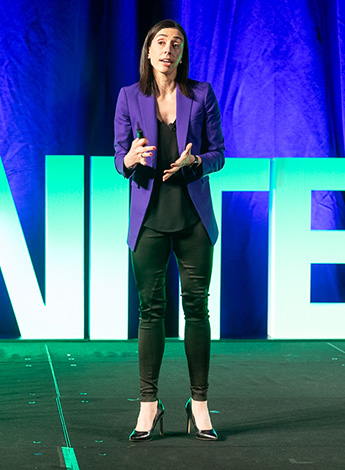
Holly Ransom closed out the IGNITE 2023 conference with a compelling plenary.
To be a leader of people in 2023 is fundamentally different from what it was 10 years ago, said public speaker, author and content curator Holly Ransom in her closing plenary.
For physiotherapists, the ability to motivate patients or lead teams requires a deep understanding of people’s perspectives and of ways to engage them to create conditions in which to thrive, Holly said.
‘Years ago, people not only stayed in the same industry for their whole career, but they often stayed in the same organisation.
‘Now the tenure of the average person inside an organisation is under five years.
‘The transferability of skills is so fluid that people can move in and out,’ Holly told the delegates.
‘I think we’re in an era where we can no longer push our message onto people.
‘We have to find a way to pull them.
‘One of the great challenges in this moment in time is “How do I inspire followership?”’
Holly also discussed the importance of creating a work environment that encourages people to challenge norms, to present ideas and to feel comfortable about giving feedback to all tiers of management.
Acting as the chief role model in your organisation and mirroring what you expect from your people is another way to promote the building of motivation from within, Holly explained.
Awarding excellence
Congratulations to the following delegates, whose presentations at the IGNITE conference won awards from their respective national groups for best paper, best clinician paper and best early career researcher paper (note: not all groups awarded prizes).
Advanced Practice
Best Paper: Leia Barnes
Animal
Best Paper: Annette Bowen
Aquatic
Best Paper: Sophie Heywood
Cardiorespiratory
Best Paper: Alison Blunt
Best Clinician Paper: Anita Plaza
Early Career Researcher Paper: Alisha Da Silva
Disability
Best Paper: Sasha Job
Gerontology
Best Paper: Katherine Lawler
Best Early Career Researcher: Rik Dawson
Mental Health
Best Paper: Ryan McGrath
Musculoskeletal
Best Paper: Luke Heales
Best Clinician Paper: Nicholas Mullen
Early Career Researcher Paper: Alana Dinsdale
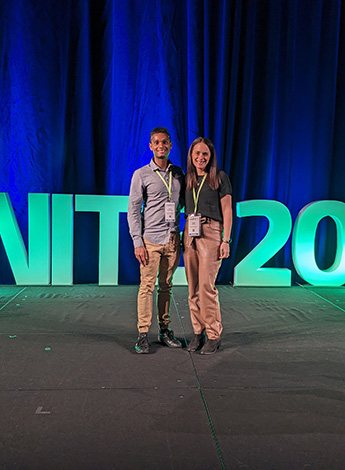
Megan Banky and Ashan Weerakody were awarded best early career researcher paper and best clinician paper respectively by the APA Neurology group. paper
Neurology
Best Paper: Sara Gallow
Best Clinician Paper: Ashan Weerakkody
Early Career Researcher Paper: Megan Banky
Occupational Health
Best Paper: James Weir
Orthopaedic
Best Paper: Larissa Sattler
Pain
Best Clinician Paper: Trudy Rebbeck
Early Career Researcher Paper: Rutger de Zoete
Physio General
Best Paper: Clarice Tang
Women’s, Men’s & Pelvic Health
Best Paper: Maria Del Pilar Martin Garcia
Best Clinician Paper: Giuilia Casson
Early Career Researcher Paper: Dragana Ceprnja
© Copyright 2025 by Australian Physiotherapy Association. All rights reserved.





